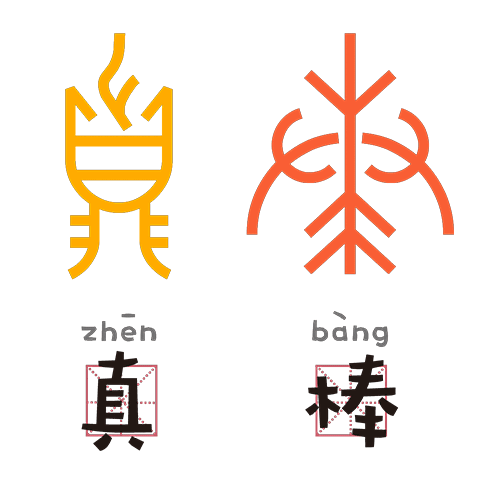甲骨文变萌表情 Ancient characters come alive on memes
Jiaguwen(甲骨文), or "oracle bone script", the earliest(最早的) Chinese writing inscriptions(文字) carved on tortoise shells(龟甲) and animal scapulas(兽骨), comes alive on Chinese internet and evolves itself as a new online language among the young generation.

"I never imagined that I can use Jiaguwen to communicate(交流) with my friends. I thought they can only be seen in my textbooks(课本) and understood(理解) by a few(少数的) researchers(研究者). Also, these memes look so creative and cute," said Sina Weibo user Daodan Xiaopan.
Chen Nan, who designs(设计) Jiaguwen memes, is happy to know that Chinese netizens like his works.
"At present, most people think Jiaguwen is hard to understand and ignore(忽略) the great historic value(价值) of it. Through using Jiaguwen memes, I truly hope that more people can develop(发展) the interest(兴趣) of the ancient characters and make it accessible to more people's daily life," Chen said.

Zhen Bang, which means “You are amazing!” in English.
"Jiaguwen is mainly the pictograph with regular strokes and beautiful form, and it can be dated back(追溯) to the Shang Dynasty (1600-1046 BC), which is regarded as the primary form(早期形式) of modern Chinese characters," Chen added.
Graduating from the Academy of Arts and Design of Tsinghua University, Chen has devoted himself to studying Chinese characters' design for 17 years.
Here are some funny Jiaguwen memes that integrate Chinese ancient writings and chic online words. Let's take a look.
![Xiang Ni, which means “I Miss you” in English. [Photo/Weibo account of Chen Nan]](https://p4crires.cri.cn/01dcri/images/zhycms_chinaplus/20180904/38cd5f8b-0810-4533-8353-58da44b6417a.gif?x-oss-process=image/resize,w_500)
Xiang Ni, which means “I Miss you” in English. [Photo/Weibo account of Chen Nan]
![Zhen Ke Ai, which means “You are adorable” in English. [Photo/Weibo account of Chen Nan]](https://p1crires.cri.cn/01dcri/images/zhycms_chinaplus/20180904/5d1d6889-ed84-4b91-9f12-b4e1476f5a51.gif?x-oss-process=image/resize,w_500)
Zhen Ke Ai, which means “You are adorable” in English. [Photo/Weibo account of Chen Nan]
![Da Jia Hao, which means “Hi, everyone!” in English. [Photo/Weibo account of Chen Nan]](https://p1crires.cri.cn/01dcri/images/zhycms_chinaplus/20180904/b8f87e14-b624-4898-85d9-14bdeb2ec759.gif?x-oss-process=image/resize,w_500)
Da Jia Hao, which means “Hi, everyone!” in English. [Photo/Weibo account of Chen Nan]
![Ai Ni, which means “Love you” in English. [Photo/Weibo account of Chen Nan]](https://p3crires.cri.cn/01dcri/images/zhycms_chinaplus/20180904/6daa0910-42ae-47d6-aef4-f45053cb98f3.gif?x-oss-process=image/resize,w_500)
Ai Ni, which means “Love you” in English. [Photo/Weibo account of Chen Nan]
![Chi Huo, which means “foodie” in English. [Photo/Weibo account of Chen Nan]](https://p2crires.cri.cn/01dcri/images/zhycms_chinaplus/20180904/fc0ec98e-6664-4283-8e79-670f3eca4457.gif?x-oss-process=image/resize,w_500)
Chi Huo, which means “foodie” in English. [Photo/Weibo account of Chen Nan]
![Fa Hong Bao, which means “red envelopes” or “Lucky money” in English. [Photo/Weibo account of Chen Nan]](https://p1crires.cri.cn/01dcri/images/zhycms_chinaplus/20180904/db858b93-d418-4956-a1de-906e61d0ee75.gif?x-oss-process=image/resize,w_500)
Fa Hong Bao, which means “red envelopes” or “Lucky money” in English. [Photo/Weibo account of Chen Nan]
![Gu Zhang , which means “Applause” in English. [Photo/Weibo account of Chen Nan]](https://p4crires.cri.cn/01dcri/images/zhycms_chinaplus/20180904/0effc9e7-c8e7-461b-9e71-66bf7a99e367.gif?x-oss-process=image/resize,w_500)
Gu Zhang , which means “Applause” in English. [Photo/Weibo account of Chen Nan]
![Hao De, which means "Okay" in English. [Photo/Weibo account of Chen Nan]](https://p1crires.cri.cn/01dcri/images/zhycms_chinaplus/20180904/6b2e5d0a-43a2-42d1-a688-0c25c7d81799.gif?x-oss-process=image/resize,w_500)
Hao De, which means "Okay" in English. [Photo/Weibo account of Chen Nan]
![Kai Xin, which means “Happy” in English. [Photo/Weibo account of Chen Nan]](https://p2crires.cri.cn/01dcri/images/zhycms_chinaplus/20180904/347541ff-e40d-4464-9748-124f8b1cef46.gif?x-oss-process=image/resize,w_500)
Kai Xin, which means “Happy” in English. [Photo/Weibo account of Chen Nan]
![Qin Qin, which means “Kiss” in English. [Photo/Weibo account of Chen Nan]](https://p2crires.cri.cn/01dcri/images/zhycms_chinaplus/20180904/fb9750fa-eb0d-4709-a116-6d02acabca34.gif?x-oss-process=image/resize,w_500)
Qin Qin, which means “Kiss” in English. [Photo/Weibo account of Chen Nan]
![Wan An, which means "Good night" in English. [Photo/Weibo account of Chen Nan]](https://p3crires.cri.cn/01dcri/images/zhycms_chinaplus/20180904/9a3ad999-9c01-40b4-a18c-3d95767045b4.gif?x-oss-process=image/resize,w_500)
Wan An, which means "Good night" in English. [Photo/Weibo account of Chen Nan]
词汇 Words:
[jiāo liú] 交流 communicate
[lǐ jiě] 理解 understand
[shè jì] 设计 design
[fā zhǎn] 发展 develop
[hū lüè] 忽略 ignore
[kè běn] 课本 textbook
[xìng qù] 兴趣 interest
[jià zhí] 价值 value
[xíng shì] 形式 form
重点词汇 Key word:
变
<动词 v.> become different; change; transform
E.g. Tiānqì biàn liāng le。
天气变凉了。
It's getting cool.<形容词 adj.> changeable; changed
E.g. Qiántú chōngmǎn le biànshù。
前途充满了变数。
The future is subject to various uncertainties.

